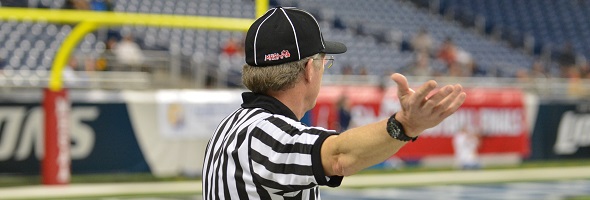
Be the Referee: Officials Demographics
October 29, 2015
This week, MHSAA assistant director Mark Uyl discusses the importance of recruiting young officials so they may gain experience now and prepare to replace veterans wearing the whistle.
Be The Referee is a series of short messages designed to help educate people on the rules of different sports, to help them better understand the art of officiating, and to recruit officials.
Below is this week's segment - Officials Demographics - Listen
A daily activity of the MHSAA is to recruit more officials in all of our sports. There is an urgency to try and bring new, younger people into the game as the current average age of an MHSAA registered official is 51.86.
Young officials are needed now so they can gain experience and be ready to step into the varsity and tournament ranks when many of our aging officials are ready to hang up the whistle. With players getting bigger and faster all of the time, it is important that our officials keep up with the pace of play, and the more younger, athletic officials we can recruit, the better off all of our games will be.
Past editions:
Oct. 15: Make the Call: Intentional Grounding - Listen
Oct. 8: Playoff Selection - Listen
Oct. 1: Kick Returns - Listen
Sept. 24: Concussions - Listen
Sept. 17: Automatic First Downs - Listen
Sept. 10: Correcting a Down - Listen
Sept 3: Spearing - Listen
Aug. 27: Missed Field Goal - Listen

Be the Referee: 40-Second Play Clock
August 29, 2019
This week, MHSAA Assistant Director Brent Rice explains the change in football to a 40-second play clock.
Be The Referee is a series of short messages designed to help educate people on the rules of different sports, to help them better understand the art of officiating, and to recruit officials.
Below is this week's segment - 40-Second Play Clock - Listen
One of the rules changes in high school football this year involves timing between downs.
All varsity games will be played with a 40-second play clock that begins after the conclusion of the previous play, with exceptions for things like timeouts, penalties, measurements and at the start of a period – when a 25-second count will be used.
In experiments in Michigan over the past few seasons, the 40-second play clock proved to improve the pace of play and consistency between plays because it is not dependent on the referee’s subjective signal. And while some schools may choose to purchase visible play clocks for their fields, it is not required. The Back Judge, who has the primary responsibility for the play clock, will signal at 10 seconds and count the last five seconds.

